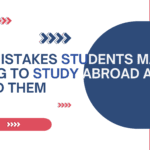Studying abroad is a dream for many students, offering opportunities for academic growth, cultural immersion, and personal development. However, the financial aspect can be daunting. The good news is that there are numerous financial aid options available to help you achieve your study abroad aspirations. In this blog, we’ll explore various scholarships, grants, and loans, and provide tips on how to apply for financial aid, write compelling scholarship essays, find lesser-known funding opportunities, and manage your finances while studying abroad.
Scholarships
Types of Scholarships
- Merit-Based Scholarships
- Awarded based on academic achievements, talents, or other criteria.
- Examples include university scholarships, private foundation scholarships, and scholarships from professional organizations.
- Need-Based Scholarships
- Awarded based on financial need.
- Often require detailed financial information to demonstrate your need for assistance.
- Country-Specific Scholarships
- Offered by governments or organizations to promote cultural exchange and education.
- Examples include the Fulbright Program (USA) and the Chevening Scholarships (UK).
- Field-Specific Scholarships
- Target students pursuing studies in specific fields such as STEM, arts, or social sciences.
- Examples include the Google Anita Borg Memorial Scholarship for women in technology.
Tips for Applying for Scholarships
- Start Early
- Begin your search at least a year before your planned departure date.
- Keep track of deadlines and requirements for each scholarship.
- Tailor Your Application
- Customize your essays and applications to match the specific scholarship criteria.
- Highlight your achievements, goals, and how the scholarship will help you achieve them.
- Seek Feedback
- Ask teachers, mentors, or peers to review your application materials.
- Make revisions based on their feedback to improve your chances of success.
- Stay Organized
- Create a spreadsheet to track deadlines, required documents, and application statuses.
- Ensure you submit all required materials on time.
Grants
Types of Grants
- Government Grants
- Provided by national or local governments to support students studying abroad.
- Examples include the Pell Grant (USA) and the Australia Awards (Australia).
- Institutional Grants
- Offered by universities or colleges to their students.
- Often based on academic merit or financial need.
- Private Grants
- Funded by private organizations, foundations, or companies.
- Examples include the Rotary International Global Grant.
Tips for Applying for Grants
- Research Thoroughly
- Look for grants specific to your field of study, destination country, or demographic.
- Use online databases and consult with your university’s financial aid office.
- Prepare Strong Proposals
- For grants that require a proposal, clearly outline your study plan, objectives, and how the grant will help you achieve them.
- Emphasize the potential impact of your studies on your career and community.
Loans
Types of Loans
- Federal Student Loans
- Available to eligible students through government programs.
- Examples include the Direct Subsidized and Unsubsidized Loans (USA).
- Private Student Loans
- Offered by banks or private lenders.
- May have higher interest rates than federal loans but can cover a wider range of expenses.
- International Student Loans
- Designed specifically for students studying abroad.
- Examples include loans from organizations like Prodigy Finance or MPOWER Financing.
Tips for Applying for Loans
- Compare Loan Options
- Evaluate interest rates, repayment terms, and eligibility criteria.
- Choose the loan that best suits your financial situation and needs.
- Understand the Terms
- Read the loan agreement carefully to understand the repayment schedule, interest rates, and any fees.
- Be aware of your responsibilities as a borrower.
Finding Lesser-Known Funding Opportunities
- Local Community Organizations
- Check with local clubs, businesses, and community organizations for scholarship opportunities.
- Examples include local Rotary Clubs or Chambers of Commerce.
- Industry Associations
- Many professional associations offer scholarships or grants to students in their field.
- Examples include the American Society of Mechanical Engineers or the National Association of Black Accountants.
- Online Scholarship Databases
- Use websites like Fastweb, Scholarship.com, or the International Education Financial Aid (IEFA) website to find additional funding opportunities.
Budgeting and Managing Finances While Studying Abroad
- Create a Budget
- List all your income sources (scholarships, grants, loans, personal savings) and expenses (tuition, accommodation, food, travel).
- Track your spending to ensure you stay within your budget.
- Open a Local Bank Account
- If you’re staying abroad for an extended period, consider opening a local bank account to avoid foreign transaction fees.
- Compare different banks to find one with student-friendly services.
- Save on Living Expenses
- Cook at home instead of eating out, use public transportation, and take advantage of student discounts.
- Look for part-time work or internships to supplement your income.
- Emergency Fund
- Set aside some money for unexpected expenses, such as medical emergencies or travel changes.
By exploring and utilizing the various financial aid options available, you can make your dream of studying abroad a reality. Remember, thorough research, early preparation, and careful financial planning are key to successfully financing your international education journey. Good luck!








